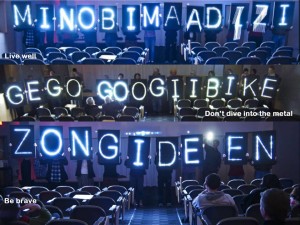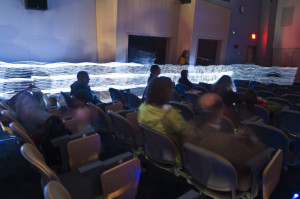Overpass Light Brigade – Ishpaa’ii’waaskone’aazhogan
The Overpass Light Brigade (OLB) is a collective of artists and activists who promote peace, democracy, and appreciation of the arts. Their messages in light are dedicated to the power of peaceful protest and artful activism. Learn more about them at http://overpasslightbrigade.org.
Below are two featured projects that Ojibwe.net has worked with OLB on.
1. World Listening Day
This video by StumpTown Media is one of our favorite parts of 2021. It was created by friends of OLB, the Electa Quinney Institute, and InNaPo on World Listening Day to remind us . . . to listen . . . to one another and . . . to all of the languages around us. In every part of the world there are Indigenous languages shaped by use over many millennia. Indigenous languages echo the knowledge about stewardship of land, water, and life. Indigenous languages allow ancestors to speak through descendants and together they acknowledge the place of humanity in the universal web. Enjoy the play of light and language as some of the Indigenous languages spoken today in Milwaukee, Wisconsin take shape in the night.
Our thanks to the Milwaukee Art Museum for their support on this project.
Consider: How will you listen in 2022? What poetry will you find, what poetry will find you, when you listen?
Words contained in the video:
Nakasohtah and Nakasotawen are the words to ask one person or many people to listen in Menominee. Known as the Mamaceqtaw in their language, speakers of Menominee remind us their creation story begins at the mouth of the Menominee River which flows over 100 miles from northern Wisconsin to the city of Milwaukee. There is only one Menominee nation on earth.
Bizindaagen and Bizindaageg in Ojibwe or Bzedagen and Bzedagek in Potawatomi are also words to ask one person or many people to listen. These languages are part of the Anishinaabe diaspora which includes 142 nations surrounding the Great Lakes. The words for listen in these languages echo the sound of the words bizaanide’e (to have a peaceful heart) and bizaanate (to be still).
Hanąxgų (seen here with an extra “h”) is the Hoocak (Ho-Chunk) word for the act of listening. Known as the “people of the sacred voice,” the Ho-Chungra have traditional lands in Wisconsin, Minnesota, Iowa, Missouri and Illinois. To hear more about their history or this word, check out the Hoocak Language Podcast by Henning Garvin: Episode 43: Hanąxgų – to listen to something; The First Treaty of Prairie Du Chien | Listen Notes
Satahuhsatat is the Oneida word “listen.” The Oneida of Wisconsin are part of the Hudenosaunee Confederacy east of the Great Lakes. After the Revolutionary War, the Oneida lost 5 million acres as the United States was created and in 1838, through treaty negotiations, they were relocated to Wisconsin. They bring to this region the history of one of the world’s oldest peacekeeping democracies, the Haudenosaunee Confederacy.
2. We Shall Overcome
Ojibwe.net worked with the Overpass Light Brigade to get the word out about issues related to the connection between the health of the land and the health of the people. Recently they created a light show of phrases and translated a famous Pete Seeger tune about song about non-violent civil action, We Shall Overcome.
The phrases:
Gego googiibike
Don’t dive into the metal
Minobimaadizi
Live well
Zongide’en
Be Brave
Debwetaan
Believe
The song:
Gi da maashkogaabowmin – We shall overcome
Gi da maashkogaabowmin
Gi da maashkogaabowmin ingoding
Indenendamide’e debwetaamaan
Gi da maashkogaabowmin
Gi da minobimaadizimin – We shall live a good life
Gi da minobimaadizimin
Gi da minobimaadizimin ingoding
Indenendamide’e debwetaamaan
Gi da minobimaadizimin
Gaawiin nigoshisiiaananig – We are not afraid
Gaawiin nigoshisiiaananig
Gaawiin nigoshisiiaananig noongwa oma
Indenendamide’e debwetaamaan
Gaawiin nigoshisiiaananig
Gi da waanakimin bi aayaaying – We shall live in peace
Gi da waanakimin bi aayaaying
Gi da waanakimin gakina agwajing
Indenendamide’e debwetaamaan
Gi da waanakimin bi aayaaying


